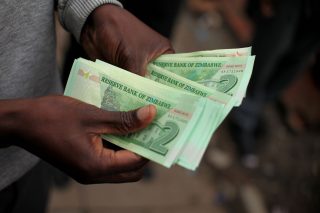In preparation for the 21-day nationwide lockdown on Monday, March 30, 2020, the Zimbabwean government legalized the use of foreign currencies in domestic transactions on Sunday, March 29 less than a year after abandoning dollarisation.
The Reserve Bank of Zimbabwe revealed last week that it would allow citizens to use foreign currencies as part of the measures taken to curb the effects of COVID-19. Consequently, the government published new exchange control regulations on Sunday making it legal for Zimbabweans to use electronic and cash foreign currencies when buying local goods. “Any person may pay for goods and services chargeable in Zimbabwe dollars in foreign currency at the ruling rate on the date of payment,” the government notice said.
Although dollarisation is expected to help provide access to private foreign exchange savings, inject different currencies into the country, and ultimately integrate Zimbabwe into the world’s market, Economists say it will do more harm than good. In an interview with BBC, Economist John Robertson stated that “the Zimbabwe dollar has failed to get any support or respect from the local population and it is falling in value.” Robertson added that dollarisation presents symptoms of bigger problems such as lack of local goods production and an over-reliance on imports.
Reports show that the Zimbabwean economy was regaining stability due to the end of dollarisation in the country. However, several experts reiterated that the move to legalize foreign currencies will further weaken the Zimbabwe dollar which has lost more than half of its value since it was brought back last June.
With Zimbabwe’s inflation rate rising from 60 percent to 540 percent over the last year, adopting dollarisation for conducting day-to-day transactions will make it very impossible for the country to influence its monetary policy. The executed legalization is highly risky because the Zimbabwean dollar is presently struggling to remain afloat. With the adoption of foreign currencies into the economy even for the period of the coronavirus outbreak, there is a possibility that dollarisation will slowly creep back into the economy and become a legal tender.
Meanwhile, as the three-week national lockdown begins in Zimbabwe, nationals lament that they will die of hunger first. In a country dealing with a severe economic crisis such as an unemployment rate above 90 percent, Al Jazeera reported that the ongoing measures to curb the spread of coronavirus will hit vulnerable people hard. “I don’t know how I will be surviving during the lockdown period because I hustle for food every day, so it’s going to be a challenge for me and my family.” Dzivira who is among the millions of unemployed Zimbabweans told Al Jazeera.








